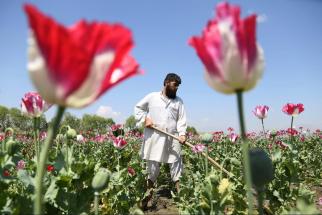Opium Cultivation in Afghanistan Hits Record

Addiction Law, History and Public Policy Articles
Drug War
Drug Prohibition
Drug War Articles
Current Trends in Drug Abuse
Global Drug Use Statistics and News
Overview
Originally Published: 11/12/2014
Post Date: 11/12/2014
Source Publication: Click here
Similar Articles: See the similar article
Video
Attachment Files
The Politics of Heroin in Southeast Asia
Summary/Abstract
Opium poppy cultivation in Afghanistan hit a record this year, a United Nations survey shows, despite a decade of international efforts to curb the drug trade. Harvest Jumped 17% From 2013 Despite International Efforts to Curb Drug Trade.
Afghanistan has long been the world’s main supplier of opium, the raw material for heroin and other opiates. The opium trade fuels official corruption, organized crime and provides funding for the Taliban. And in addition to being an exporter, the country is now struggling to cope with a growing population of addicts.
Content
While the U.S. alone has spent $7.8 billion fighting the drug trade in Afghanistan since the 2001 invasion, the country’s opium harvest has jumped 17% from last year to about 6,400 tons, according to a report released Wednesday by the U.N. Office on Drugs and Crime and Afghanistan’s Ministry of Counter Narcotics. The area that is used to grow opium increased 7% this year to around 224,000 hectares (553,516 acres).
And Afghanistan isn’t likely to wean itself from opium soon, U.N. officials say.
“As the international community, we failed on counternarcotics,” said Jean-Luc Lemahieu, the UNODC’s director for policy analysis, who presented the report. “You have the highest addiction rate, you have the highest cultivation rate. The point is: How do we move forward?”
The drug trade is central to Afghanistan’s fragile economy. According to Mr. Lemahieu, it is roughly equivalent to 20% of the country’s gross domestic product, and the industry indirectly employs more than 410,000 people—even more than Afghanistan’s armed forces.
The report’s findings add to fears among Afghanistan’s international backers that the country is increasingly relying on a drug trade that benefits the Taliban and organized crime, just as the U.S.-led military coalition is winding down its combat operations. After the end of this year, just 12,500 foreign troops, most of them American, will remain in Afghanistan to focus on counterterrorism and on training Afghan troops.
The Special Inspector General for Afghanistan Reconstruction, a U.S. watchdog agency, warned in a report last month that the narcotics trade was undermining the legitimacy of the Afghan state.
“The expanding cultivation and trafficking of drugs is one of the most significant factors putting the entire U.S. and international donor investment in the reconstruction of Afghanistan at risk,” said John Sopko, the head of the agency.
UNODC’s Mr. Lemahieu said that the expansion of the poppy industry was expected as foreign troops pull out and farmers hedged against insecurity during a crucial election year.
But he also expressed hope that the government of newly inaugurated President Ashraf Ghani would take a more robust and comprehensive approach to the problem of opium cultivation.
“If one element was missing over the past decade, it was perhaps political will,” said Mr. Lemahieu.
For Mr. Ghani, on the other hand, “the criminalization of the politics and economics of Afghanistan is one of the main problems.”
Poppy cultivation is more common in areas where security is worst. Nearly half of all of Afghanistan’s poppy fields are in Helmand, a southern province that saw some of the worst fighting between Afghan troops and insurgents in recent months. This year, cultivation expanded also in provinces like Badakhshan in the north and Nangarhar in the east, where security deteriorated sharply.
Drawn from the sap of poppy-seed pods, opium is easy to store and is more lucrative than other crops grown in Afghanistan. This harvest season, one kilogram of dry opium sold for $114, a 20% drop from last year.
Abdul Rahim Baryalai, a tribal elder from Helmand’s district of Nawzad, said that people there had few alternatives to growing opium.
“They are under pressure from the Taliban, who don’t let them work for the government or for other organizations,” he said.





